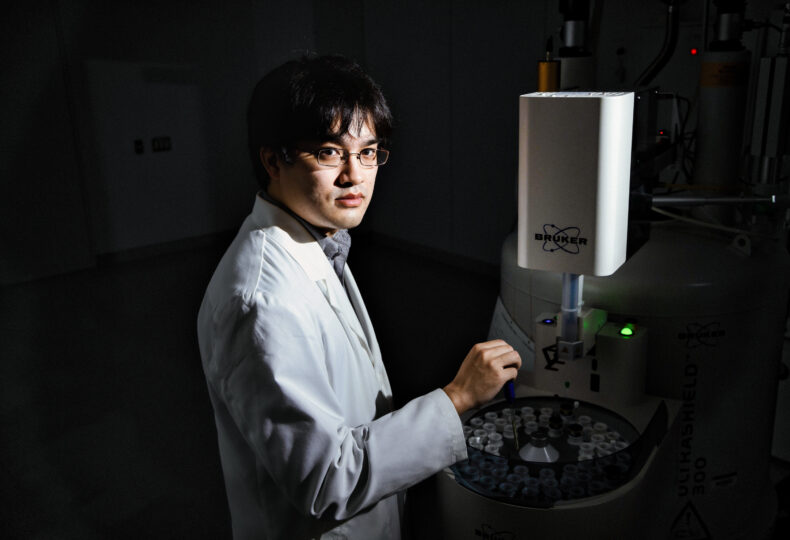
Taking on the field of middle molecule drugs / On the forefront of research for dehydrating condensation agents to overcome the challenges of peptide synthesis
Middle molecule drugs, particularly peptide drugs, have been gaining attention in recent years. Many major pharmaceutical companies in Japan have also been announcing their entry into middle molecule drugs. MANAC is also researching dehydrating condensation agents, needed to manufacture peptide drugs, based on its own cultivated arsenal of small molecule synthesis and halogen technologies. We spoke with Mr. Kenya Fukuda, researcher at MANAC’s Shonan Lab, to learn more.
■ What you can learn from this article ✔ Peptide drugs combine the benefits of small molecule and antibody drugs, with growth anticipated. ✔ MANAC is using its small molecule synthesis technology to research dehydrating condensation agents for peptide drugs. ✔ Mr. Fukuda is tackling three challenges in peptide synthesis through innovative approaches. ■ Recommended Articles ・ Full-scale launch of Manac’s Shonan Lab to develop original technologies and products / Aiming to identify needs and develop Manac’s technologies ・ Achieving high purity, cost reductions, and GSC / At the forefront of bromine microflow synthesis research
contents
Peptide drugs on the rise even among middle molecule drugs
Traditional drugs are categorized as either small molecule drugs with a low molecular weight, or as antibody drugs, which are large molecule drugs. Middle molecule drugs are pharmaceuticals that fall roughly between the molecular weights of small molecule drugs and antibody drugs.
Because small molecule drugs have a low molecular weight, they can enter cells, are useful for precise targeting, can be administered orally, and are inexpensive to manufacture. However, since small molecule drugs have a low level of specificity toward targets, they easily cause side effects.
In contrast, antibody drugs are very effective as medicine and do not easily cause side effects owing to their strong specificity toward targets. But because of their large molecular weight, antibody drugs are unable to enter into cells. Further disadvantages include high manufacturing costs due to the inability to produce antibody drugs through chemical synthesis, as well as the inability to administer antibody drugs orally.
Middle molecule drugs, which are gaining much attention, strike a balance between small molecule drugs and antibody drugs. Boasting a low occurrence of side effects as a result of high specificity, the ability to enter cells, available chemical synthesis processes for low manufacturing costs, and applications for oral administration, middle molecule drugs have the “best of both worlds.”
Middle molecule drugs can be largely classified into peptide drugs and nucleic acid drugs. With major pharmaceutical companies in Japan particularly active in the development of peptide pharmaceuticals, this is an area that is expected to grow.
The reason behind MANAC’s peptide synthesis research
MANAC is taking on the areas of middle molecule drugs and peptide drugs, which are expected to grow, as it saw an opportunity to leverage its extensive catalog of technologies for small molecule synthesis toward peptide synthesis.
Dehydrating condensation agents are crucial for carrying out peptide synthesis under moderate reaction conditions. Many different types of dehydration condensation agents have been developed, including those that contain halogen atoms.
According to Mr. Fukuda, “Halogen has a negative reputation, such as being harmful to the environment, and so there has been a tendency to shy away from using dehydrating condensation agents with halogen atoms as a part of pharmaceutical manufacturing processes. And since there has been a lot of development for many other types of dehydrating condensation agents, there hasn’t been enough research into dehydrating condensation agents that contain halogen atoms.”
“With its long experience in development, MANAC excels in handling halogen and should be able to provide these reagents at a lower cost by applying its process chemistry. We believe that we can enter the peptide drug field if we can develop peptide coupling reagents that compare favorably with current dehydrating condensation agents.”

The three challenges to creating new dehydrating condensation agents
In order to create new dehydrating condensation agents, the three challenges for peptide synthesis described below must be overcome. “We are already testing many different types of structures. Very recently, we have gained the ability to create unique structures with elements of originality, and we would like to effectively improve upon these and develop new dehydrating condensation agents that can overcome these difficult challenges,” explains Mr. Fukuda.
1. Yield per reaction
Peptide pharmaceuticals involve structures in which dozens of amino acids are bonded, which require an equal number of dehydrating condensation reactions. If the yield of the targeted product is low for each single reaction, multiple rounds of the reaction significantly worsen the overall yield.
Achieving the targeted compound at a high purity without producing byproducts in each single reaction is key.
2. Only one of the stereoisomers is usable for pharmaceuticals
Compounds that exhibit chirality (a characteristic of asymmetry in which an object cannot be superimposed to its mirror image, such as is the case with left and right hands) generally demonstrate efficacy as pharmaceuticals in only one of the isomers.
Since epimerization causes the loss of compound isomers with pharmaceutical efficacy, conducting reactions that can suppress such epimerization as much as possible is crucial yet challenging.
3. Solving the challenges of current dehydrating condensation agents
As was explained earlier, there are many different types of dehydrating condensation agents in use today, but these are not without challenges of their own.
Improving upon current dehydrating condensation agents with additional features at a low cost to achieve competitive products over existing ones is a difficult challenge. Examples of sought improvements include realizing lower toxicity and raising removal performance for byproducts resulting from dehydrating condensation agents following reactions.
Tokyo born, Yokohama raised, from the Tokyo Institute of Technology to MANAC
Mr. Fukuda, born in Tokyo and raised in Yokohama, attended the School of Science at the Tokyo Institute of Technology, and graduated from graduate school. He was not yet interested in organic chemistry when he first entered university but rather became interested while taking various classes. Mr. Fukuda then advanced to the Department of Chemistry and chose a lab where he could conduct orthodox organic synthesis.
Mr. Fukuda explained how he came to join MANAC. “Although I remember seeing MANAC’s name on a major recruitment company’s website, I wasn’t planning on applying since I was focused on major corporations when I first started job hunting activities. As I continued with my job hunting, an agent introduced information about MANAC to me. It was then when I first really looked into MANAC, which I found to be an interesting company capable of actively carrying out organic synthesis.”
“Even when I talk to my former lab mates from university, there aren’t many who carry out organic synthesis at work after joining a company. My work involves carrying out a lot of organic synthesis, which is my forte, and it also allows me to apply the experience I have built up, so I’m very glad I joined MANAC.”















